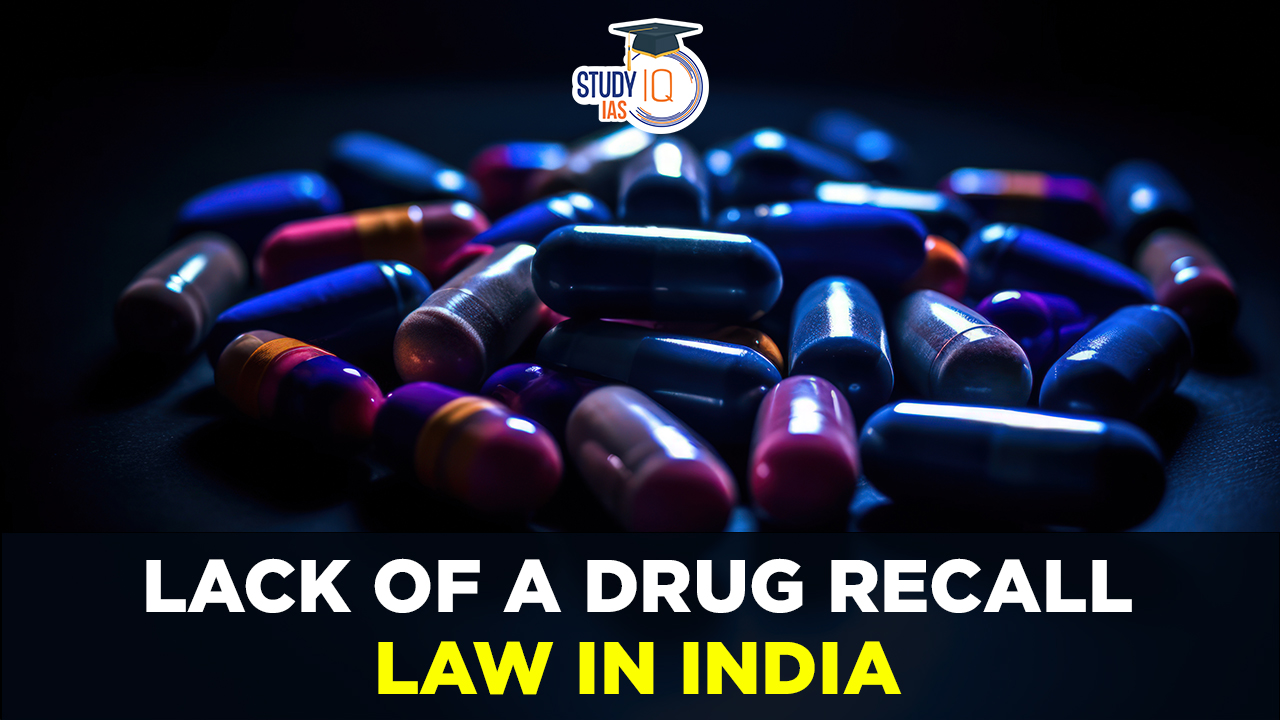Table of Contents
Context: Multinational pharmaceutical company Abbott has published a public notice in newspapers alerting people about a mislabelled batch of medicine, intending to recall it from the market.
What is Drug Recall?
- Drug recall is the action of withdrawing/removing the drugs from distribution or use due to deficiencies reported in quality, efficacy or safety.
- Defective drugs may include Not of Standard Quality (NSQ), Adulterated or Spurious drugs. It may also cover drugs prohibited under the Provisions of Drugs & Cosmetics Act.
- Once a drug is found to be Not of Standard Quality (NSQ), it is the responsibility of the drug company to withdraw the entire batch from the market.
- Status of Drug recall law in India:
- In many parts of the world, including the US, there is a law that requires pharmaceutical companies to recall batches of drugs from the market that have failed to meet quality parameters.
- India has been looking to bring in a law since 1976, which requires mandatory recall of substandard drugs from the market. However, currently there is no law that mandates such drug be removed from the market.
- Since 1976, meetings have been conducted in this regard but none of them resulted in amendments to the Drugs and Cosmetics Act to create a mandatory recall mechanism for drugs.
- Even though certain recall guidelines were published by the CDSCO in 2012, they lacked the force of law.
- The current regime is exceptionally opaque due to absence of transparency requirements or mandatory disclosures requirements in the law.
- The Drugs, Medical devices and Cosmetics Bill 2022, which will replace the Drugs and Cosmetics Act 1940, contains procedure for recall of Ayurvedic, homeopathic medicines etc but does not contain provisions of recalling allopathic drugs.
Recall Mechanism in India
- The Drugs & Cosmetics Act & Rules contains references for product recalls, complaint and adverse reactions.
- These rules are applicable to all quality defective product reports and to all reported incidents of safety and efficacy received for all drugs including vaccines & biological.
- These guidelines must be followed by licensees (manufacturers, importers, stockists, distributors, retailers) and the recall could be voluntary or statutory.
- However, the Rapid Alert System will provide alerts in only those cases where urgency and seriousness cannot permit any delay in transmission.
Reasons for Absence of Drug Recall Law in India
- Incompetence of authorities: The Drug Regulation Section of the Union Health Ministry is unable to tackle complex drug regulatory issues due to a combination of factors including apathy, lack of expertise etc.
- Vested interests: There have been indications that Ministry of Health has greater interest in enabling the growth of the pharmaceutical industry than protecting public health.
- It is believed that tighter regulation could slow the growth of the pharmaceutical industry.
- Fragmented regulatory structure: India has one of the most fragmented regulatory structures with each State having its own drug regulator. One regulator cannot inspect facilities in another jurisdiction.
- Opposition to centralized authority: There must be a central authority that has legal powers to hold companies liable for failures to recall drugs. However, pharmaceutical industry and state drug regulators have opposed centralization of regulatory powers.
- Bad publicity to pharma companies: A drug recall will mandate companies to publicize the product in media, which will generate bad publicity for pharma companies. This will not only harm them individually but will dent India’s image on the global scale.
Effects of Absence of Drug Recall Law
- Fatality: Consumers, especially children, are most likely to die or suffer from adverse health events because substandard drugs are not quickly removed from the market.
- Prevent reforms: A recall law may force drug companies to reform their manufacturing as well product quality. In absence of such law, no major reforms are likely to take place, making them incompetent against best of the products.
- Cross-border sale: In case state drug regulators order the withdrawal of a particular batch from their state, there is a high possibility that the same batch is sold in other states.
- No regular inspections: In absence of a strong centralized mechanism for drug regulation or recall, state regulators are not compelled to carry out regular inspection of the facilities.
Way Forward
- India as a whole is the single-largest market for drugs, and it should have one regulator. In absence of centralized regulator, incompetence of a regulator in one State can lead to adverse effects for patients in other States.
- The recent incidents of poor quality of Indian pharma products abroad have forced authorities to look into the matter. Such events may degrade reputation of Indian products.
- There is a need for centralisation of licensing aspect of drug regulation. All manufacturing facilities should be licensed by a national regulator to ensure uniform quality of drugs.


 Serious Fraud Investigation Office (SFIO...
Serious Fraud Investigation Office (SFIO...
 Article 142 of Indian Constitution, Sign...
Article 142 of Indian Constitution, Sign...
 Pakistan-Occupied Kashmir (PoK): History...
Pakistan-Occupied Kashmir (PoK): History...





















